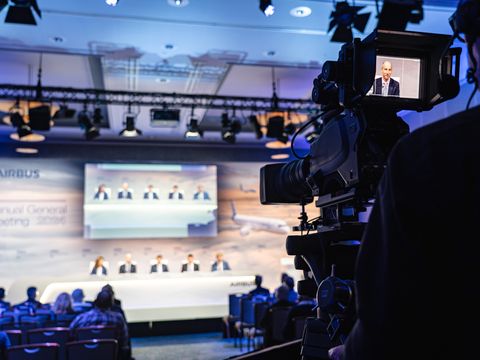Board and Board Committees
Corporate Governance

The Board of Directors
Under the Articles of Association, the Board of Directors is responsible for the management of the Company and consists of a maximum of 12 members, appointed and removed at the Shareholders’ Meeting. The Board is charged with the overall conduct of the Company, the management, direction and performance of the Company and its business.
The Board Rules specify that in addition to the Board of Directors’ responsibilities under applicable law and the Articles of Association, the Board of Directors is responsible for certain enumerated categories of decisions.
Under the Board Rules, the Board of Directors delegates the day-to-day management of the Company to the CEO, who, supported by the Executive Committee, makes decisions with respect to the management of the Company. However, the CEO may not enter into transactions that form part of the key responsibilities of the Board of Directors unless these transactions have been approved by the Board of Directors.
Members of the Board of Directors
(As of 15 April 2025)
| René Obermann | Chairman of the Board of Directors of Airbus SE |
| Guillaume Faury | Chief Executive Officer of Airbus SE |
| Victor Chu | Non-Executive Director |
| Jean-Pierre Clamadieu | Non-Executive Director |
| Mark Dunkerley | Non-Executive Director |
| Stephan Gemkow | Non-Executive Director |
| Catherine Guillouard | Non-Executive Director |
| Dr. Doris Höpke | Non-Executive Director |
| Amparo Moraleda | Non-Executive Director |
| Irene Rummelhoff | Non-Executive Director |
| Antony Wood | Non-Executive Director |
| Prof. Dr. Feiyu Xu | Non-Executive Director |
The Audit Committee
Pursuant to the Board Rules, the Audit Committee, which is required to meet at least four times a year, makes recommendations to the Board of Directors on the approval of the annual financial statements (FY) and the interim (Q1, H1, Q3) accounts, as well as the appointment of external auditors and the determination of their remuneration.
Moreover, the Audit Committee has the responsibility for verifying and making recommendations to the effect that the internal and external audit activities are correctly directed, that internal controls are duly exercised and that these matters are given due importance at the meetings of the Board of Directors. Thus, it discusses with the auditors their audit programme and the results of the audit of the accounts and it monitors the adequacy of Airbus’ internal controls, accounting policies and financial reporting. It also oversees the operation of Airbus’ Enterprise Risk Management system and the Compliance Organisation.
The Chairman of the Board of Directors and the Chief Executive Officer are invited to attend meetings of the Audit Committee. The Chief Financial Officer and the Head of Controlling and Accounting are requested to attend meetings to present management proposals and to answer questions. Furthermore, the Head of Corporate Audit and the Chief Compliance Officer are requested to report to the Audit Committee on a regular basis.
Members of the Audit Committee
(As of 15 April 2025)
| Stephan Gemkow | Chair, independent |
| Mark Dunkerley | Member, independent |
| Catherine Guillouard | Member, independent |
| Dr. Doris Höpke | Member, independent |
| Antony Wood | Member, independent |
Remuneration, Nomination and Governance Committee
Pursuant to the Board Rules, the Remuneration, Nomination and Governance Committee (RNGC), which is required to meet at least four times a year, consults with the CEO with respect to proposals for the appointment of the members of the Executive Committee and makes recommendations to the Board of Directors regarding the appointment of the Secretary to the Board of Directors.
The RNGC also makes recommendations to the Board of Directors regarding succession planning at Board, Executive Committee and Senior Management levels, remuneration strategies and long-term remuneration plans. Furthermore, the Committee decides on the service contracts and other contractual matters in relation to the Members of the Board of Directors and the Executive Committee.
In addition, the RNGC reviews top talents, discusses measures to improve engagement and to promote diversity, reviews the remuneration of the Executive Committee members, the Long Term Incentive Plans (LTIP), and the variable pay.
Finally, the RNGC performs regular evaluations of the Company’s corporate governance and makes proposals for changes to the Board Rules or the Articles of Association.
The guiding principle governing management appointments within Airbus is that the best candidate should be appointed to the position (“best person for the job”), while at the same time seeking to achieve a balanced composition with respect to gender, experience, national origin etc. The implementation of these principles should, however, not create any restrictions on the diversity within the Company’s executive management team.
The Chairman of the Board of Directors and the Chief Executive Officer are invited to attend meetings of the RNGC. The Chief Human Resources Officer Airbus is requested to attend meetings to present management proposals and to answer questions.
Members of the Remuneration, Nomination and Governance Committee
(As of 15 April 2025)
| Amparo Moraleda | Chair, independent |
| Jean-Pierre Clamadieu | Member, independent |
| Mark Dunkerley | Member, independent |
| Dr. Doris Höpke | Member, independent |
The Ethics, Compliance & Sustainability Committee
Pursuant to the Board Rules, the Ethics, Compliance and Sustainability Committee has as its main mission to assist the Board in overseeing Airbus’ culture and commitment to ethical business, integrity and sustainability. It is required to meet at least four times a year. At least twice a year, the Committee dedicates one of its agenda items to sustainability topics.
It also monitors Airbus’ ethics and compliance programme, organisation and framework for the effective governance of ethics and compliance matters, including all associated internal policies, procedures and controls, which include the areas of money laundering and terrorist financing, fraud, bribery and corruption, trade sanctions and export control, data privacy, procurement and supply chain compliance and anti-competitive practices. It also oversees Airbus' sustainability strategy and effective governance and ensures that sustainability related topics are taken into account in the Company's objectives and strategy.
In addition, the Board can, on a case-by-case basis, delegate to the Ethics, Compliance and Sustainability Committee any task which is ethics-and-compliance or sustainability related.
The Ethics, Compliance and Sustainability Committee will, among others, monitor any of the aforementioned responsibilities of the Audit Committee that are regarding compliance-related matters and will also provide any necessary disclosures of the status of major investigations into ethical or compliance breaches or allegations of misconduct – especially financial and accounting-related – to the Audit Committee.
Members of the Ethics, Compliance & Sustainability Committee
(as of 15 April 2025)
| Jean-Pierre Clamadieu | Chair, independent |
| Victor Chu | Member, independent |
| Stephan Gemkow | Member, independent |
| Catherine Guillouard | Member, independent |
| Amparo Moraleda | Member, independent |
| Irene Rummelhoff | Member, independent |







